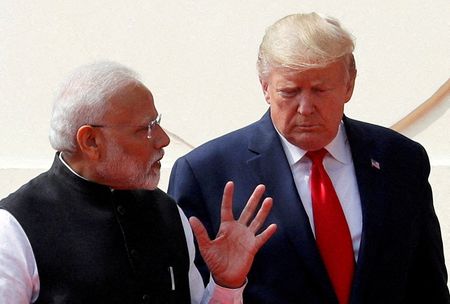By Emily Chow
SINGAPORE (Reuters) – Oil prices fell on Thursday on expectations that a potential peace deal between Ukraine and Russia would end sanctions that have disrupted supply flows, while crude inventories rose in top producer the United States.
Brent futures were down 68 cents, or 0.9%, at $74.50 a barrel by 0515 GMT, while U.S. West Texas Intermediate (WTI) crude dropped 65 cents, or 0.9%, to $70.72.
Brent and WTI fell more than 2% on Wednesday after U.S. President Donald Trump said Russian President Vladimir Putin and Ukrainian President Volodymyr Zelenskiy expressed a desire for peace in separate phone calls with him, and Trump ordered top U.S. officials to begin talks on ending the war in Ukraine.
Russia is the world’s third-largest oil producer and sanctions imposed on its crude exports as a result of its invasion of Ukraine nearly three years ago have supported higher prices.
In a note on Thursday, ANZ analysts said oil prices eased on news of the potential peace talks because of “optimism that risks to crude oil supplies would ease”, pointing to the U.S. and E.U. sanctions that are pushing down Russia’s output.
“Signs of tightening supply have been pushing up oil prices in recent weeks,” they said. “U.S. sanctions on Russian oil companies and vessels are said to have exacerbated the situation.”
A build in crude oil inventories in the United States, the world’s biggest crude consumer, also weighed on the market. U.S. crude stocks rose more than expected last week, data from the Energy Information Administration (EIA) showed on Wednesday.
Crude inventories rose by 4.1 million barrels to 427.9 million barrels in the week ended Feb. 7, the EIA said, beating analysts’ expectations in a Reuters poll for a 3-million-barrel rise.
“This recent downturn in crude oil futures follows a period of consecutive inventory builds,” said Darren Lim, a commodities strategist at Phillip Nova.
“Geopolitical developments, such as proposals to end the conflict in Ukraine, could put crude oil prices under further pressure.”
Trump’s threat of additional tariffs against U.S. trade partners also pressured prices, because of concerns that may reduce economic growth and therefore oil demand.
Trump said he would impose reciprocal tariffs as soon as Wednesday evening on every country that charges duties on U.S. imports, in a move that ratchets up fears of a widening global trade war and threatens to accelerate U.S. inflation.
(Reporting by Georgina McCartney in Houston and Emily Chow in Singapore; Editing by Christian Schmollinger and Clarence Fernandez)










